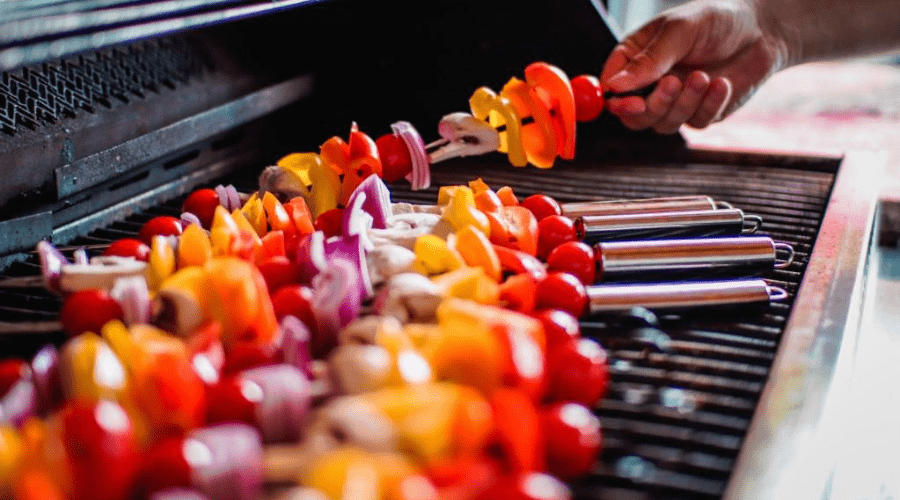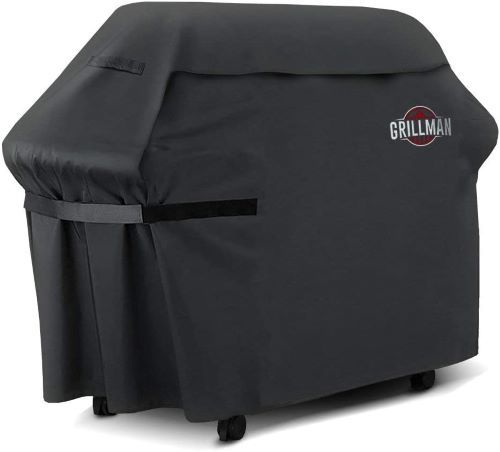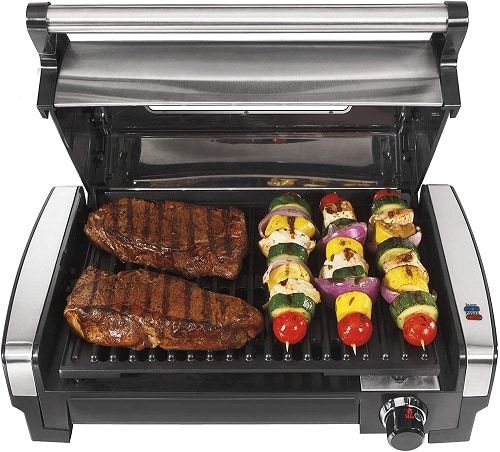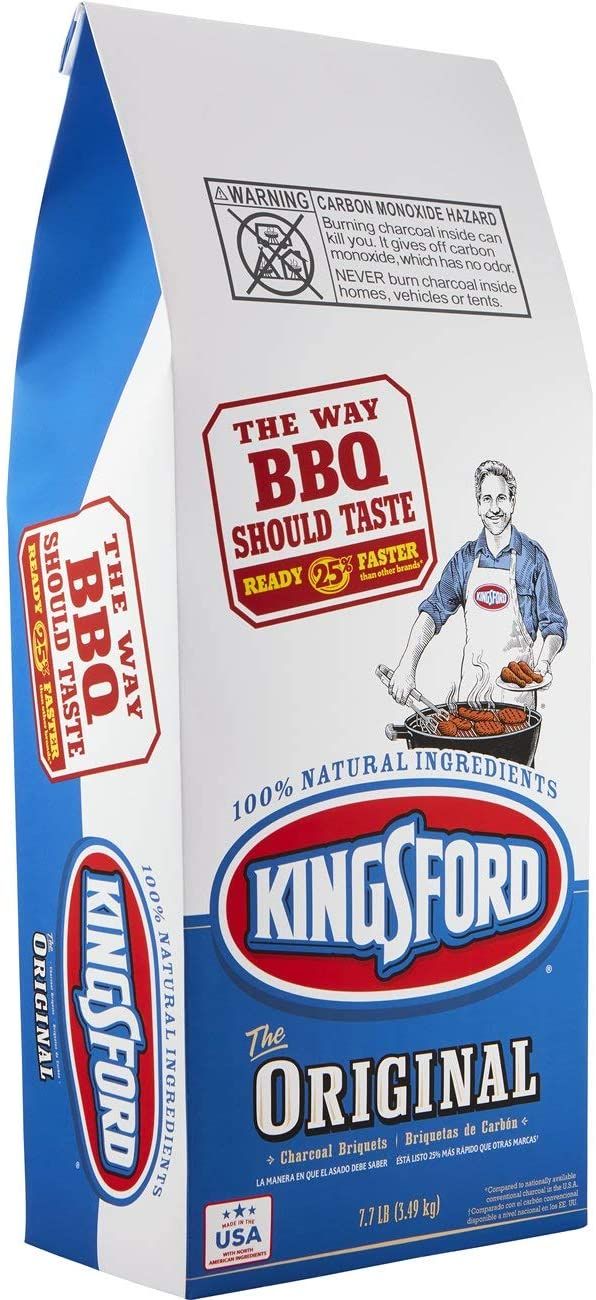Whether you already own a grill, are looking to replace a grill, or want another cooking option, a new grill is an investment that should be considered carefully. There are endless options, but to find the right grill for you, you first have to decide: gas, electric, or charcoal? We've broken down the pros and cons of each so you can weigh your options and find the right grill for your needs.
How to Choose: Gas vs. Electric vs. Charcoal
There is no one grill that will suit everyone. That's why there are so many to choose from! And while we can't tell you which grill you need, we can help you narrow down the type of grill you're looking for.
To know what to buy, you must first know how you want to use it. Do you want to sear a quick steak now and then, or grill veggies for regular weeknight dinners, or throw block parties on the regular? Are you comfortable working with propane tanks? Will you be intimidated by the cleanup charcoal requires?
Take into account the types of foods you like to grill. Will you want to smoke meats, cheeses, and other options? How much space do you have to use and store a new BBQ? Will the upkeep of one type be a dealbreaker for you? Write down what you would like to use it for, how big a space you have for it, what your approximate budget is, and the amount of time you anticipate having for routine maintenance and cleaning.
Then, keep that list in mind as you work through the benefits, drawbacks, cost considerations and cleaning, care and storage info for each type to help you determine which grill suits your needs best.
Gas Grills
Gas grilling is by far the most popular choice for the majority of backyard barbecues. Even people who prefer other methods often have a propane gas grill as well, since it is a quick way to cook over an open flame for those evenings you don’t have the time to wait for a slower method. It also is a great way for those new to grilling to get started with the technique.
Gas grills work via a hose regulator connection to the gas burners. These are either connected to a natural gas line or propane tank. You have complete control over flame height, strength, and thus the temperature through the control knobs. Plus they heat up in mere minutes, opposed to other grilling fuel types, making them incredibly convenient.
Benefits of a Gas Grill
Since you are cooking over an open flame, but not actually burning anything to do so, you take away the smoke of a charcoal grill, as well as some of the concerns about carcinogenic compounds in that smoke. Propane is a good choice for those who want ease, minimal cleanup, quick heating and cooling, and the fire of a traditional grill. Plus, you still get an authentic barbecue flavor, especially if you use liquid smoke in your seasoning, although it may not be as strong as other choices depending on what you are cooking.
Drawbacks of a Gas Grill
There are a few drawbacks to consider, however. If your grill is attached to a natural gas line, it makes it a more permanent feature and doesn’t allow you as much flexibility with placement. Propane hookups are much more popular, but they can be dangerous, especially if regular hose and regulator maintenance is not considered. For the most part, backyard gas grills have a tendency to be a lot larger than other grill options.
Gas Grill Costs
Gas grills come in a fairly wide variety of cost profiles due to the many sizes and features that may be included. These are definitely an affordable choice, and actually encompass portable versions used for camping, tailgating, and travel. Some even come with additional features that allow you to convert them to charcoal or wood burning for smoking. Although this may cost more, if you are interested in flexible fuel choices for grilling, this may save you money in the long run.
As with all large purchases, it's important to factor in the costs of maintenance and storage. For a gas grill, of course, you're going to need to price propane in your area. Additionally, you'll need to ensure your tools and accessories are safe at the high temps of a propane grill, and it's important to own a quality grill cover for both short- and long-term storage.
If you're looking for a dependable and heavy-duty cover, the GrillMan Premium Cover is just what you need.
- Durable fabric
- Compatible with most grills
- Lifetime replacement
- Fades quickly
|
|
Electric Grills
Electric smokeless grills are the perfect answer to small spaces, apartment living, or times when cooking out of doors is not an option. Additionally, they are incredibly easy to use and provide excellent temperature control. Simply connect to a standard 110 volt household outlet and start cooking! They are also a very safe option as they don’t reach nearly as high of temperatures as gas and charcoal grills.
Benefits of an Electric Grill
Of all the choices, electric grills offer the least smoky flavor payoff. Indoor grills are a quick, healthy option for regular use, but it is very non-traditional, and if you are a serious griller it is not a popular choice. They are efficient for cooking at a steady temperature, heat and cool quickly, clean up easily, and cost next to nothing in the way of upkeep and power usage.
Drawbacks of Electric Grills
Electric grills, despite their convenience and flexibility for indoor and outdoor use, are not as popular as other choices. For starters, if you are looking for a more traditional open flame flavor, this is not going to get it for you.
Electric Grill Costs
Indoor electric grills are very affordable and typically are a tabletop, or tabletop hybrid choice for easy portability. They generally are sold as a kitchen appliance and are a very budget friendly option. Even a very high-end model runs less than the cheapest propane grill, and even though some might find comparative price points in a charcoal grill, the ease of use and not having to buy charcoal offset that difference very quickly, particularly if you use it often.
It's lightweight (under 8 pounds) and gets very very hot. The combination of dishwasher-safe components and quick preheating mean you'll use it frequently.
- High maximum temperature leaves perfect sear marks
- Viewing window lets you monitor the cooking process
- Cooks for up to 6 people
- Plastic housing is fragile
- Teflon coating starts to flake off if mishandled
|
|
Charcoal Grills
Charcoal grills are often found in backyards as they are a traditional way to barbecue over open flame. These are generally a compact, rounded or square grill size and compliment propane grills nicely. They also can double as a smoker if prepped properly.
Charcoal grills require charcoal briquettes to work which release heat and smoke as they burn. They also take time to come to heat, and temperatures are not as easy to control compared to other grill options. You will need to prepare your grill up to 30 minutes before using it for cooking. They aren’t difficult to use, but do take some practice to perfect.
Charcoal Grill Benefits
If flavor is your main goal of using a grill, charcoal grilling tastes better than any other option. A charbroiled, smoky flavor is the result when you cook on a charcoal grill, and you can control heat for searing and warming, or slower smoke infusion by moving and piling the charcoal into various areas under the grilling grates. If you are wondering if a gas or charcoal grill is better for flavor infusion, always go with charcoal.
Drawbacks of Charcoal Grills
As mentioned, maybe the biggest drawback is the wait time to get the grill up to temperature for cooking. Prepping to cook on a charcoal grill takes time, and isn’t always feasible for a busy weeknight the way an electric or propane grill might be.
Charcoal also takes time to cool down, so you aren’t completely done even after you have finished cooking. And it isn’t smart to leave your grill hot and unattended. It also is messy to grill with and requires more cleanup than other grilling options.
Cost
Charcoal grills are also very affordable and are usually the first grill many people buy. Their various sizes also allow you to take them with you for camping or tailgating purposes. Combined with the flavor profiles it provides, you can create some of the best meals on a budget. Aside from the basic maintenance costs of a good brush, oil for your grate and firebowl, and the grill itself, the only associated cost is charcoal.
The king of charcoal’s all-natural briquettes burn smoothly and evenly, with twin grooves that make lighting easy and help maintain open airflow.
- Efficient twin grooves design
- Long, consistent burn
- Inexpensive
- Produces a lot of ash
|
|
Conclusion
Hopefully this helps explain the differences between gas, electric, and charcoal grills to provide the details you need to determine which of these designs are best for your needs. Whether you are looking for healthy choices, quick cooking choices, or the best flavor possible, these all have their own sets of pros and cons to consider. You don’t have to limit yourself to just one style either. Many grills incorporate more than one kind together to provide you choices.
We’d love to hear about your favorite grill and what you use them for. And, as always, please share.





